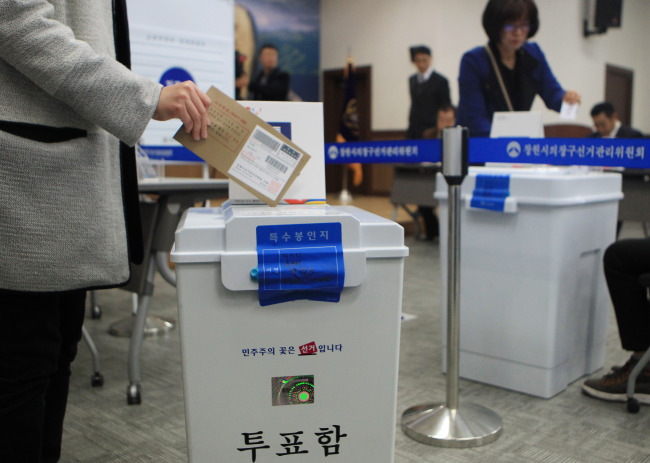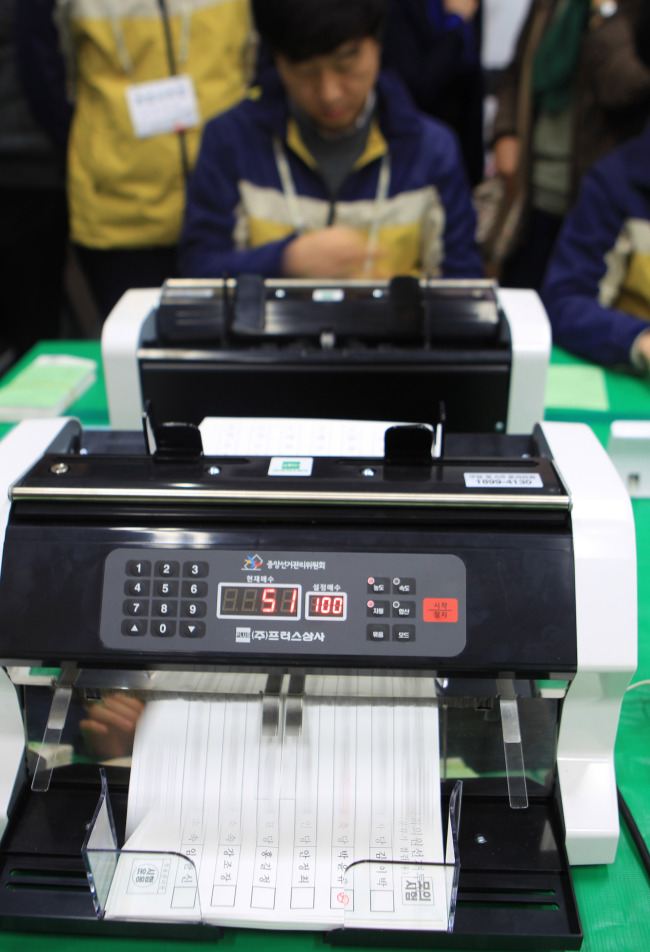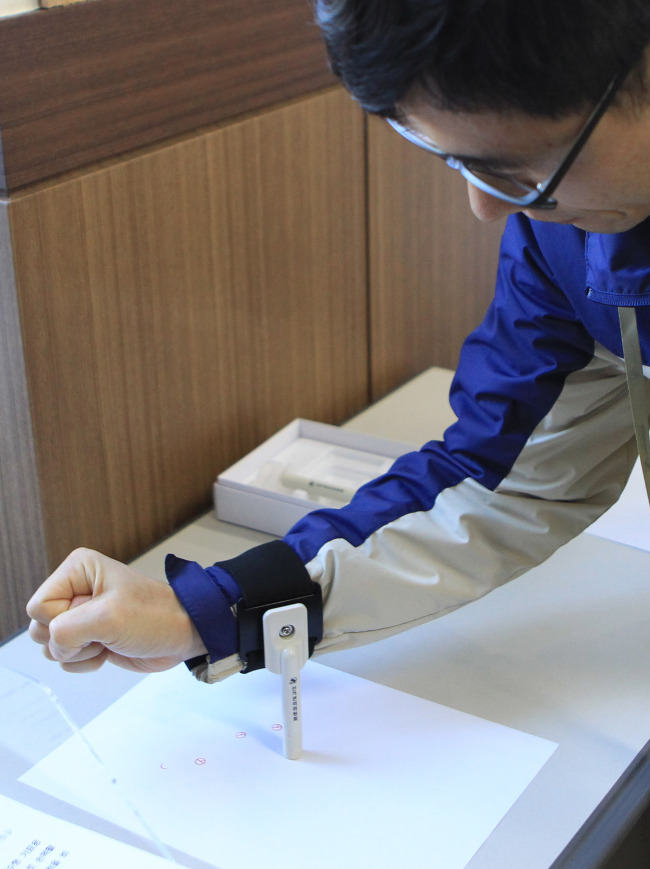[ELECTION 2016] Korea readies for election with advanced balloting system
By Yeo Jun-sukPublished : March 27, 2016 - 21:47
South Korea will elect new National Assembly members in a general election on April 13. The Korea Herald is publishing a series of articles on candidate agendas, election trends and notable runners leading up to the race. This is the ninth installment. --Ed
At the April 13 general election, voters here will see a significant change in the balloting process, with an improved system to guarantee reliability and accuracy.
The National Election Committee announced that it would be implementing new electoral rules that mandates polling stations use holographic technology to authenticate ballot boxes. This method to prevent counterfeit notes will be attached to the boxes and used to unlock them.
The election watchdog said that the changes were designed to increase efficiency in managing votes compared to the previous use of near-field communication technology.
According to officials, the NFC-based system had cost a huge amount of taxpayers’ money and was also time-consuming for public workers.
“The use of NFC to verify ballot boxes was quite a complicated process,” said Lee Jae-yoon, a public relations official from the election watchdog group.
At the April 13 general election, voters here will see a significant change in the balloting process, with an improved system to guarantee reliability and accuracy.
The National Election Committee announced that it would be implementing new electoral rules that mandates polling stations use holographic technology to authenticate ballot boxes. This method to prevent counterfeit notes will be attached to the boxes and used to unlock them.
The election watchdog said that the changes were designed to increase efficiency in managing votes compared to the previous use of near-field communication technology.
According to officials, the NFC-based system had cost a huge amount of taxpayers’ money and was also time-consuming for public workers.
“The use of NFC to verify ballot boxes was quite a complicated process,” said Lee Jae-yoon, a public relations official from the election watchdog group.

NFC chips were previously installed on the boxes to act as locks. Ballot counters had to verify them by downloading a mobile app to read the NFC code. The app was also only available for android phones.
The authorities highlighted that the new system is as reliable as the previous one because the holographic images are only accessible via a digital watermark. Election officials will be assigned to the polling stations to oversee the process.
The holographic images are also designed in a way that prevents duplication and reuse. They are also cheaper than the previous system by around 10 to 20 million won as they only require printing expenses.
The use of holographic images is one of the measures that the election watchdog group is taking to address concerns among some progressive lawmakers and activists about the reliability and accuracy of the nation’s vote-counting system.
The authorities highlighted that the new system is as reliable as the previous one because the holographic images are only accessible via a digital watermark. Election officials will be assigned to the polling stations to oversee the process.
The holographic images are also designed in a way that prevents duplication and reuse. They are also cheaper than the previous system by around 10 to 20 million won as they only require printing expenses.
The use of holographic images is one of the measures that the election watchdog group is taking to address concerns among some progressive lawmakers and activists about the reliability and accuracy of the nation’s vote-counting system.

Other measures include the decision to remove wireless LAN cards from laptops used by the election watchdog.
Lawmakers, such as Rep. Jung Chung-rae from the main opposition The Minjoo Party of Korea, had raised concerns that the laptops are vulnerable to hackers aiming to rig the elections.
The election watchdog also changed the appearance of ballots to reduce undervotes. There will be spaces between the names of candidates on ballots so that voters will be less likely to cast nullified votes by marking on the boundaries.
“Since the previous ballots did not have spaces between the names of the candidates, some votes marked on the boundary and were counted as null,” said Lee.
“We are less likely to debate whether some ballots should be nullified or not,” she added.
Other changes include the introduction of machines to count and sort ballots. There will also be a tool to assist those with difficulties in using their hands to cast ballots by using their wrists or mouth.
Lawmakers, such as Rep. Jung Chung-rae from the main opposition The Minjoo Party of Korea, had raised concerns that the laptops are vulnerable to hackers aiming to rig the elections.
The election watchdog also changed the appearance of ballots to reduce undervotes. There will be spaces between the names of candidates on ballots so that voters will be less likely to cast nullified votes by marking on the boundaries.
“Since the previous ballots did not have spaces between the names of the candidates, some votes marked on the boundary and were counted as null,” said Lee.
“We are less likely to debate whether some ballots should be nullified or not,” she added.
Other changes include the introduction of machines to count and sort ballots. There will also be a tool to assist those with difficulties in using their hands to cast ballots by using their wrists or mouth.

The election next month will also be the first parliamentary election in which balloters can vote in advance without having to preregister themselves as legitimate voters.
Advance voting will take place from April 8 to 9. Those who will not be able to make it on the actual election date can visit designated polling stations, identify themselves and vote. In the past, balloters had to register themselves as legitimate voters beforehand to cast their ballots in advance.
Sailors at sea will also be able to cast their ballots on board ships for the first time. They will mark their ballots on the vessel and send them to election authorities via telecommunication. The ballots will be sent to the NEC sealed, a measure to prevent the NEC from revealing the sailors’ votes.
Such advanced electoral system has attracted attention from abroad.
Earlier this year, the NEC signed memorandum of understandings with the election watchdog groups of other countries -- including the Democratic Republic of Congo, Republic of Maldives and Republic of Uzbekistan -- to share balloting technology.
“The focus of cooperation is how to build an electronic voting system that can prevent vote-rigging and improve vote counting,” said Kim Young-tak, a NEC official dealing with the agency’s foreign aid programs. “They place more trust in an electronic counting system than manual ones,” he said.
The official added that there are talks underway with the Kenyan and Ecuadorian governments to provide them with technical support in their upcoming elections. He highlighted that the Korean system appeals to these nations due to its accuracy and rapid process of vote counting.
Kyrgyzstan, a nation that became independent country in 1991, was the first country to use Korea’s electronic voting system at its parliamentary election. Seoul provided the fledgling democracy with financial support to establish electronic voting machines and improve its electoral procedures.
By Yeo Jun-suk (jasonyeo@heraldcorp.com)



![[Exclusive] Korean military set to ban iPhones over 'security' concerns](http://res.heraldm.com/phpwas/restmb_idxmake.php?idx=644&simg=/content/image/2024/04/23/20240423050599_0.jpg&u=20240423183955)

![[Graphic News] 77% of young Koreans still financially dependent](http://res.heraldm.com/phpwas/restmb_idxmake.php?idx=644&simg=/content/image/2024/04/22/20240422050762_0.gif&u=)



![[Pressure points] Leggings in public: Fashion statement or social faux pas?](http://res.heraldm.com/phpwas/restmb_idxmake.php?idx=644&simg=/content/image/2024/04/23/20240423050669_0.jpg&u=)









